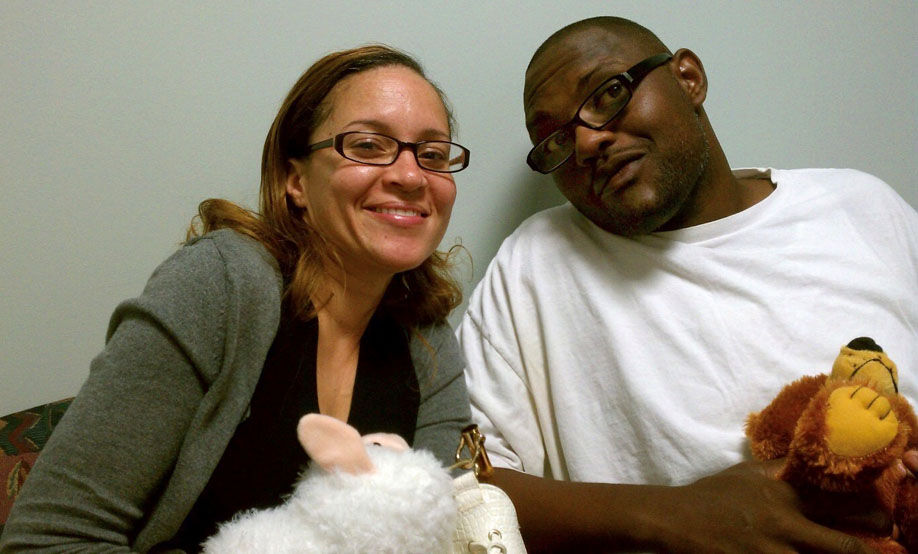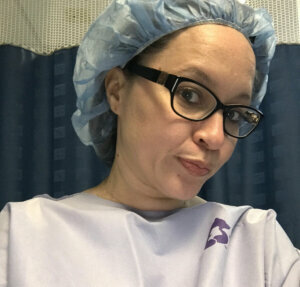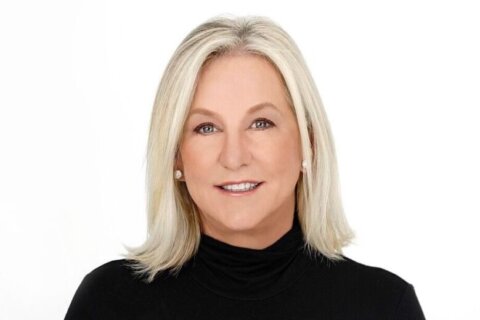
A Silver Spring, Maryland, woman who donated a kidney to her husband is pleading with people who are reluctant to get a transplant to learn more about the organ donation process.
“A lot of people don’t want to get kidneys because they’re scared. It’s about being comfortable,” Darlene Harris said. “There are a lot of people I’ve talked to who’ve been on dialysis and prefer to do that because they know what dialysis is like, but they don’t know if this kidney is going to work or what happens after they receive the kidney.”
Her husband, Dennis Harris, has had two transplants: He received a kidney from her in July 2012 and, diagnosed with Type 1 diabetes as a child, he needed and got a pancreas in December 2015.
Now, four-and-a-half years after his last surgery, the freedom he enjoys “is just an amazing blessing,” he said.

“It is amazing to be back to normal, where I don’t have to take a lot of different types of insulin, and I don’t have to worry about having to do my (dialysis) exchanges,” said Dennis Harris.
“When you are on dialysis, you are consumed with it. Everything you do, from what you eat, to what you drink, to the way that you lay, to the way you sleep. Everything that you do is controlled by it,” he said.
He believes some people don’t know there are options for them to have a better quality of life.
The couple is concerned about members of the African American, Latino and other minority communities who are reluctant about receiving a transplant.
“They don’t see things that look similar to them, and they think that things like this cannot happen for them,” Dennis Harris said.
His message: “People who look like you have done things that you need. It’s OK to ask them questions, and be inquisitive, and ask them how things are going for them after transplant.”
There are more than 6.5 million donor registrations in the National Donate Life Registry, but more are needed. Nearly 70% of people waiting for organ transplants in the D.C. area are from multicultural communities and would have better chances at finding matches with someone of the same race.
Nationwide, African Americans make up the largest group of minorities in need of an organ transplant, according to the U.S. Department of Health and Human Services’ Office of Minority Health.
In 2019, the number of organ transplants performed on African Americans was 25.8% of the number of African Americans currently waiting for a transplant. In contrast, the number of transplants performed on white Americans was 47.6% of the number currently waiting.
And while 28.7% of the total candidates currently waiting for transplants are African Americans, they comprised 12.5% of organ donors in 2019, according to the Office of Minority Health.
“You can help someone while you’re living, or when you’re deceased,” Darlene Harris said of signing up to be an organ donor. “One person can save up to eight lives after they pass away.”
A 2012 study published in the Journal of Community Health identified barriers that contribute to African Americans being less willing to donate organs than whites, which include lack of awareness about transplantation, religious myths and perceptions about donation, distrust of the medical community, concerns about premature declaration of death for donors and racism.
The study pointed out the legacy of historical medical abuses, such as the Tuskegee syphilis experiment, as contributing to medical distrust.
The Tuskegee syphilis study happened from 1932 to 1972 in Alabama. Black men were promised free health care, but they were not informed of the study or its real purpose. The men were misled and not given all the facts required to give informed consent. Nor were they given treatment for their disease when it became available in 1947.
Dr. Derek DuBay, at the Medical University of South Carolina, told BBC News that surveys he and a team of researchers conducted also found that many African Americans fear their organs would not be usable due to prevalent ailments among African Americas, such as high blood pressure and heart disease.
DuBay believes education could be key in disabusing potential donors of this belief.
“We need to enhance education to let them know that a lot of times these organs are acceptable for transplant,” DuBay told BBC News. “And even though the heart might not be good for transplant,” another organ might be.
Dennis Harris stressed the wider impact of organ donations for recipients, “to have their family to be able to be with them longer, their life expectancy to be longer, their quality of life to be better.”
Darlene Harris was happy to be a direct match to donate to her husband, but she said she still would have undergone the procedure to facilitate a donor registry swap with another donor to get a kidney for him.
If a kidney donor eventually develops kidney failure themselves, they’re given priority on the donor list to receive one.
“They also have data to show that people who donate typically don’t need kidney replacement themselves,” Darlene Harris said.
To register to be an organ, eye and tissue donor, you can visit the Donate Life website.
WTOP’s Abigail Constantino contributed to this report.








